
Home -
Foreword -
Georg Philipp -
Piano Business -
Lymington -
Trees -
Related Topics
Alphabetical Links -
Email: family@klitzandsons.co.uk
|
Piano Business |
 |
History of R. Klitz & Son
Later called KLITZ'S MUSIC WAREHOUSE
Finally became KLITZ'S LIMITED until closure in 1982
FROM THE LYMINGTON CHRONICLE, THURSDAY 28 MARCH 1901
Messrs. R. Klitz and Son - Re-opening of Business Premises
Another very important and handsome shop has recently been added to the High Street, and makes an artistic addition to the many substantial business premises which form such a striking feature of our thoroughfare. We refer to the music saloon at 88 High Street, so long occupied by the firm of Messrs. R. Klitz and Son, founded in 1789 by Mr Georg Philipp Klitz, who was succeeded by the late Mr Robert John Klitz, and is now conducted by his son, Mr William Lawson Klitz, who is assisted by his son, Mr Harold Philip Klitz, a great-grandson of the original founder - a unique record for a Lymington family.
The work was entrusted to Mr. H. Preston of Highfield and has certainly been carried out most successfully; the new shop presenting a very high-class and artistic front to the High Street and being so arranged, decorated, fitted, lighted and up-holstered that it invites inspection and wins the admiration of those who do so; besides adding considerably to the architectural beauty of the town.
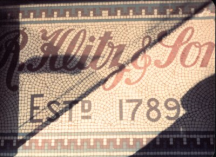 In place of the old front with many small windows, there are now two plate glass squares with a lobby entrance, whilst these squares are surmounted with small panes of coloured glass, which add much to the general effect; and the floor of the lobby entrance is marked by a fine piece of mosaic pavement, the name of the firm and the date of it's establishment being conspicuous.
In place of the old front with many small windows, there are now two plate glass squares with a lobby entrance, whilst these squares are surmounted with small panes of coloured glass, which add much to the general effect; and the floor of the lobby entrance is marked by a fine piece of mosaic pavement, the name of the firm and the date of it's establishment being conspicuous.
The shop itself has been brought down to a level with the street pavement which gives it a foot more in height than formally. The white lincrusta ceiling, dark oak floor and delicate colouring of the walls lend lightness and piquancy to the general surroundings; and at night, illuminated by electricity, the effect is brilliant in the extreme and attracts the notice of all - the electric light pendant in the windows being of an especially charming character and design, very much admired.
The shop was opened for the first time since the alterations, on Monday with an entirely new stock, which included some remarkably handsome and full-toned pianos by Pleydel, Collard and Collard, Eungblut and Eungblut, Bord etc; organs by Esty, Kelly etc; and a variety of small instruments, sheet music etc.
Adorning the walls are some quaint old portraits and prints and also an interesting programme, printed on white satin, of a performance given at the Lymington Theatre (now the Literary Institute) in September 1842, under the patronage of Lord Seaham and J. Rivett Cornac Esq.
In addition to the alterations to the shop, the workshops at the rear have also been brought thoroughly up-to-date - the firm doing everything on their premises relative to repairs, of which they make a speciality. Their business extends from Southampton Water to Bridport and includes South Wilts, South Hants, Dorset and the western end of the Isle of Wight; each district being visited periodically.
We cannot but congratulate Messrs. Klitz and Sons on their public enterprise and the handsome business premises they now possess, and trust they will find the considerably outlay made will lead to a large increase in business.
The introduction of golden brown art curtains for the shop windows, in place of blinds or shutters, is unique, and we expect to see this innovation copied wherever it can be conveniently adopted.
Compiled for the programme 'Pieces from the Past' for Radio Solent in July 1979 by Stephen F. Goodyear
"If you are in Lymington and walk up the High Street towards St. Thomas' Church you'll pass a shop called Klitz's Music Warehouse. It doesn't seem extraordinary today but it is a monument to a remarkable family.
The first Klitz (Georg Philipp) to settle in Lymington was a bandmaster who arrived in 1789; he saw a future in Lymington and settled there. It is thought he arrived with a regiment. He built up a business and handed it over to his sons who became the local experts on pianos and other aspects of music. Some of their account books have survived from about 1840 to 1900 and these provide a fascinating picture of a small country business growing up.
By 1840 they had built up a good connection in and the surrounding towns as far as the Isle of Purbeck and the Isle of Wight and their reputation extended even further. One, Colonel Hawker refers to Klitz senior as "the Clementi of Lymington",which, from him, was a compliment. (See 'Lymington' for more details) He occasionally played chamber music with them and I'm glad to have found an entry of one of his purchases in the ledgers. He bought the Overture to 'Maritana' on the 7th January 1846 and presumably took it back to his cottage at Keyhaven.
Poster This is a copy I have made because the actual poster is very difficult to read. I have tried to copy the types of font and the design layout that was used on the original.
In 1846 though, Klitz's was a well-established business; even in 1840 they had yearly contacts to tune at least 70 pianos, four times a year, usually at a guinea each piano, quite apart from casual tunings at 3/6 to 7/- a time! This meant that whoever tuned the pianos would be out of the shop almost every day. I suppose that one of the Mr. Klitzes took out a horse and vehicle with his tools, a supply of spare parts and strings that were much in demand. It seems that square pianos were very likely to break a string; and that some families were greater thumpers than others. Lady Burrard of Walhampton always seemed to need new strings on her instruments; but then she had several pianos including one in the schoolroom. She wasn't alone in having several pianos. Most of the big houses had several - and how many types there were! Klitz's tuned ordinary pianos, cottage pianos, square pianos, grand pianos, cabinet pianos, oblique and upright ones; and even one that is mis-described as a monocordon or microcordon depending on which entry you look at.
 Most of the repairs seem to have been done on the spot, even to fitting new pedals, but serious damage meant bringing the instrument where it could be worked on more conveniently. There was also a regular trade in re-stringing harps and occasionally in bringing their appearance back to standard. Re-lacquering, repairing and cleaning harp 1858 - £15.0.0. That must have been a very a superior instrument to have had all that money spent on it
Most of the repairs seem to have been done on the spot, even to fitting new pedals, but serious damage meant bringing the instrument where it could be worked on more conveniently. There was also a regular trade in re-stringing harps and occasionally in bringing their appearance back to standard. Re-lacquering, repairing and cleaning harp 1858 - £15.0.0. That must have been a very a superior instrument to have had all that money spent on it
It must have been very pleasant to get away from the shop in summer, going to tune pianos in Rumbridge, Wareham, Worgate, Blandford, Pimperne, Bere Regis, Fordingbridge, Wilton, the Isle of Wight or Wimborne but the winter journeys - everybody wanted their piano ready for December - can't have been so pleasant. The winters were worse then. Colonel Hawker frequently reports that Keyhaven harbour was frozen over in mid-winter in the forties and fifties.
They didn't only carry music either; according to the books they sold at various times (I think they had some land somewhere) hay, straw, butter, cheese, swedes, pigs, pork, clothes and even fatted calves. Of course, it might have been a service to their customers - "If you're coming out to tune our piano, could you pick up a fatted calf or a two? - Dear Mr Klitz is so helpful".
The Klitz's didn't neglect any source of income; they made pianos, they repaired pianos; they re-polished them; they sold instruments and music and hired them; they also sold concert tickets and raffle tickets; they gave lessons, both instrumental and vocal; they gave concerts; and they conveyed pianos to wherever they were wanted. In this connection it's worth noticing that pianos were always moved in cases, that could be hired, of course and that one Klitz and a porter were considered enough to move a piano!
The standards of work in those days weren't like ours; not like ours at all. In one account book there is a list of the materials required to re-polish one piano. Of course this was French polishing which is very different from today's polyurethanes:
3 quarts button polish. 2 ditto white. 1 ditto red. Spirits of wine (finishing). 1/2 pint brush polish (red). ½ pint ditto (transparent). 1 pint pale glaze. 2 pints linseed oil. 1 tin colour. Rags, wadding and screws 2/6. 3 quires glass paper. Total £9.9.0 1/2d. Sutton carriages 3/-.
All this had to be rubbed on, rubbed down (which is quite a different thing) and allowed to dry, for many coats, all without letting the polish build up irregularly and with due care at the edges. The account doesn't mention the cost of the labour but it must have been a lot, even at the wages then paid. But it did give a marvellous though fragile finish.
The young men seem to have gone in for solo instruments and songs, Brass and Woodwind were popular, with the strings providing steady sales but there is little evidence of much reed instrument playing, though there was at least one clarinet player and one bassoonist in the area. The clarinet must still have been something new, or fairly new, since Mozart discovered it as a new instrument not too long before, and also when the Ethiopian Serenaders had made their kind of music popular, there was a mild rush for banjos and tambourines including a 32 inch tambourine specially made by Klitz in 1853 for £3.15.0d.
The guitar seems to have been more of a ladies instrument - the guitars of that period did have rather a weak tone but plenty of strings were sold. A lady in Wheelers lodgings is recorded as having hired a guitar for a month in 1848.
Hiring Instruments was quite common particularly for country house entertainments and some people hired before they bought. The Literary Institute in Lymington was a regular customer. Ringwood ran a series of amateur concerts and there were always the balls and quadrille parties.
May 1856 Mrs Cumberbatch, Lyndhurst, tuning and ball tickets £3.1.6. December 1856 gentleman's tickets bought by Mrs Solly, Lady Rivett Carnac, Lady Carnac of Rockcliff and by Mrs Cumberbatch. 1846 Evening, Quadrill engagement, Mrs West, Arnwood.
But there were sometimes difficulties over having had a ball. March 1st 1858 Mrs Peacock, Efford Hall, share in ball losses £2.0.0. April 8th Mr Harry Burrard, stewards share in ball losses £1.18.9.
There were concerts too. Not only Concerts by the Klitz family - you can see one of their posters in the Lymington shop - but, apart from the ones that you would expect at the Literary Institute and so on, private entertainments, at which the Klitz's could be asked to perform. Mrs. F. Ellman, Pylewell. Attending theatrical performance and rehearse as agreed, £1.11.6.
 Pianos were however the firm's real business and when they opened another shop, in Southampton (In Bedford Place, and its still there though under different management) it, too, became prosperous. I knew it as a small boy and was fascinated by the workshop which is still there much as it always has been; you could see real craftsmen working on the pianos and hear about the mysterious and long drawn out process of French polishing the cases.
Pianos were however the firm's real business and when they opened another shop, in Southampton (In Bedford Place, and its still there though under different management) it, too, became prosperous. I knew it as a small boy and was fascinated by the workshop which is still there much as it always has been; you could see real craftsmen working on the pianos and hear about the mysterious and long drawn out process of French polishing the cases.
They tuned and repaired organs too. Milton, Hordle, Fordingbridge, Ringwood, St. Giles (I don't know whether this was Wimborne St Giles or in Winchester), Milford and the Independent Chapel at Wareham were all maintained by the Klitz's, as was Baron Hambro's private organ at The Abbey Wilton. The Milton organ was a barrel-organ for the Reverend Smith ordered a new barrel in 1855 and another in 1856.
The military too bought music and instruments. Colonel d'Arcy bought a flageolet in 1845 but it apparently didn't take, because he returned it quite soon. He later repented and bought another one. An unnamed artilleryman bought a flute, and Sergeant-Major Beaumont bought four brass instruments. Perhaps one of his officers had decided that it would be a good thing if they had a band and sent the Sergeant Major off to buy one. Apparently he didn't provide enough money because the Sergeant Major had to deposit the major part of the bill and come back later with the rest - and the total bill for four brass instruments was £4.15.0d.
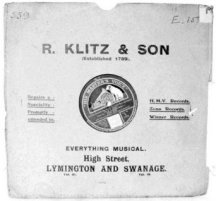 |
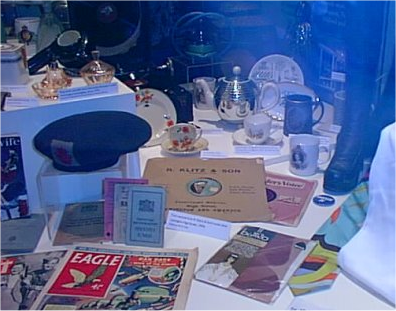 |
The record sleeve beside another in the St. Barbe Museum, Lymington. |
The firm was apparently prospering but how well? It's hard to say because the books aren't complete; but in 1856 their turnover was over a thousand pounds - and wages for a polisher were 27/- a week. It all depends on how much profit stayed with them but they seem to have been doing well for a small firm. Of course there were several members to support but they were all working it seems; and their confidence in each other is shown by such entries as: Book made up; the till owing Charles £6.16.0. and Robert owing the till £10.12.6.
As I said the firm is still there; and if you go in you might feel a thrill at the connection with 1780 when the first Klitz looked upon Lymington and saw that it was good".
Stephen Goodyear 1979 - Radio Solent (Edited Edition)
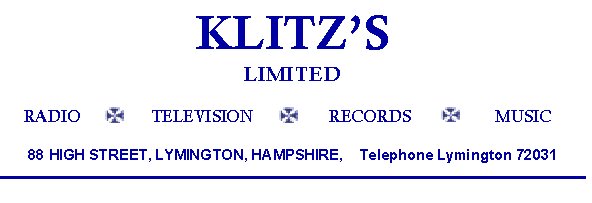
KLITZ MUSIC SHOP in 1980
See the Hampshire Records Office information about the piano business
On a recent visit to Jean in Cornwall, she told Chris Marchant that when Robert John retired from the business, Greville joined Charles to keep it going until Leslie took it over. When Leslie died Raymond agreed to take it on but when he retired there was no one else to follow him, so it was thus closed and sold in 1981 to Freeman, Hardy and Willis, shoe shop.
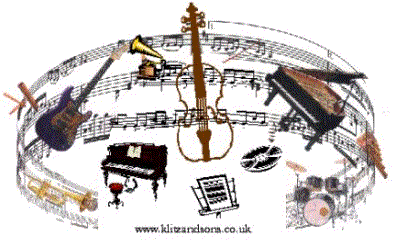
back to top
Piano Business